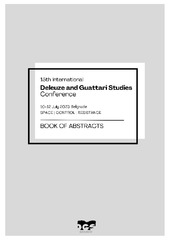Приказ основних података о документу
Control and Archaism
| dc.creator | Hristov, Đorđe | |
| dc.date.accessioned | 2023-11-27T13:33:35Z | |
| dc.date.available | 2023-11-27T13:33:35Z | |
| dc.date.issued | 2023 | |
| dc.identifier.isbn | 978-86-82324-44-7 | |
| dc.identifier.uri | http://rifdt.instifdt.bg.ac.rs/123456789/3627 | |
| dc.description.abstract | The presentation will delve into the relationship between control society and archaism. Deleuze’s conceptualization of control implies the reconfiguration of former spaces of discipline. While the Foucauldian model of discipline was characterized by enclosed spaces (such as prisons, armies, and churches), Deleuze’s notion of control highlights a continuous network where individuals are no longer molded but modulated. This prompts us to ponder the shift in the temporal structure that occurs during the transition from a disciplinary society to one governed by control. Specifically, this presentation aims to explore the disparities in our historical perspectives when viewed from disciplinary and control paradigms. In this context, I will explore Deleuze and Guattari's concept of ‘archaism’. According to Deleuze and Guattari, archaism is an inherent aspect of capitalism, its continual endeavor to reconstruct territoriality and replicate antiquated coding patterns. Capitalism necessitates archaism due to its lack of inherent belief structures. In essence, the system, which the duo name the ‘age of cynicism’, requires the revival of old codes to sustain its systems of subjugation and dominance. As my presentation will demonstrate, one can discern a transformation in the evolution of archaism as society shifts from discipline to control. By comparing the fascist archaism of the thirties in Germany and the archaism of contemporary alt-right movements, I will show that a disciplinary society presupposes a more centralized form of archaism, which is highly susceptible to state control and deeply ingrained in the institutional fabric of social life. Conversely, a control society implies a diversification and creativity in archaic attitudes, hinting at its potential for emancipation—a viewpoint emphasized by Deleuze and Guattari themselves in ’Anti-Oedipus’. | sr |
| dc.language.iso | en | sr |
| dc.publisher | Belgrade : Institute for Philosophy and Social Theory, University of Belgrade; Faculty of Media and Communications, University of Plymouth | sr |
| dc.relation | "info:eu-repo/grantAgreement/MESTD/inst-2020/200025/RS//" | sr |
| dc.rights | openAccess | sr |
| dc.rights.uri | https://creativecommons.org/licenses/by/4.0/ | |
| dc.source | 15th International Deleuze and Guattari Studies Conference Book of Abstracts | sr |
| dc.subject | archaism | sr |
| dc.subject | control | sr |
| dc.subject | Deleuze and Guattari | sr |
| dc.subject | Anti-Oedipus | sr |
| dc.title | Control and Archaism | sr |
| dc.type | conferenceObject | sr |
| dc.rights.license | BY | sr |
| dc.rights.holder | Autor | sr |
| dc.citation.spage | 70 | |
| dc.citation.epage | 71 | |
| dc.type.version | publishedVersion | sr |
| dc.identifier.fulltext | http://rifdt.instifdt.bg.ac.rs/bitstream/id/12601/DGS2023-Book-of-Abstracts.pdf | |
| dc.identifier.rcub | https://hdl.handle.net/21.15107/rcub_rifdt_3627 |

